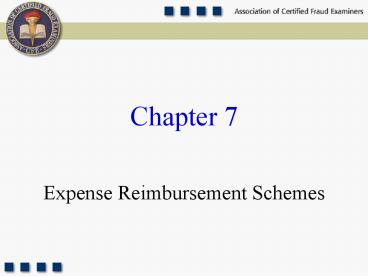Expense Reimbursement Schemes - PowerPoint PPT Presentation
1 / 21
Title:
Expense Reimbursement Schemes
Description:
Airfare, hotel bills, business meals, mileage,ground transportation and so on ... Example: Airline ticket stub and travel agency's invoice ... – PowerPoint PPT presentation
Number of Views:717
Avg rating:3.0/5.0
Title: Expense Reimbursement Schemes
1
Chapter 7
- Expense Reimbursement Schemes
2
Expense Reimbursement Schemes
Mischaracterized Expenses
Overstated Expenses
Fictitious Expenses
Multiple Reimbursements
3
Frequency of Fraudulent Disbursements
Expense Reimbursement
4
Median LossFraudulent Disbursements
Expense Reimbursement
5
Dollar Loss DistributionExpense Reimbursement
Schemes
6
Detection of SchemesExpense Reimbursement Schemes
7
Perpetrators Expense Reimbursement Schemes
8
Median Loss by Perpetrator
9
Size of VictimExpense Reimbursement Schemes
10
Median Loss by Number of EmployeesExpense
Reimbursement Schemes
11
Expense Reimbursement Schemes
- Employees are reimbursed for expenses paid on
behalf of the employer - Airfare, hotel bills, business meals,
mileage,ground transportation and so on - Business purpose explained and receipts attached
per the organizations guidelines
12
Mischaracterized Expense Reimbursements
- Purpose of reimbursement request is misstated
- Reimbursement for personal expenses not allowed
- Personal trips listed as a business trips
- Non-allowable meals with friends and family
- Most are by high-level employees, owners, or
officers (in the study) - Common element lack of detailed expense reports
13
Preventing and DetectingMischaracterized Expenses
- Establish a policy that clearly states what will
and will not be reimbursed - Require detailed expense reports with original
support documentation - Require direct supervisory review of all travel
and entertainment expenses
14
Preventing and DetectingMischaracterized Expenses
- Scrutinize any expense report that is approved
outside the requestors department - Compare dates of claimed expenses to work
schedules - Compare prior year expenses to current year
expenses and to budgeted expenses - Track expense reimbursements by employee
15
Overstated Expense Reimbursements
- Altered receipts
- Overpurchasing
- Overstating another employees expenses
- Orders to overstate expenses
16
Preventing and DetectingOverstated Expense
Reimbursements
- Require original receipts for all expense
reimbursements - If photocopied receipts are submitted,
independently verify the expense - Compare employees expense reports with
co-workers to identify inconsistencies - Look for unusual trends in expense reimbursements
- Spot check expense reports with customers
17
Fictitious Expenses
- Producing fictitious receipts
- Personal computers
- Calculators
- Cut and paste
- Obtaining blank receipts from vendors
- Claiming the expenses of others
- Other forms
18
Example Fictitious Expenses
- Robert obtained blank letterhead sheets from
hotels and then created an Excel template to
reproduce invoices. He created and printed,
using the hotels letterhead sheets, invoiced for
fictitious dates and amounts. Caught when an
internal auditor noted invoices from different
hotels with the same format.
19
Preventing and Detecting Fictitious Expense
Reimbursements
- High dollar items that were paid in cash
- Expenses that consistently rounded off, ending
with 0 or 5 - Expenses that are consistently for the same
amount - Reimbursement requests that consistently fall at
or just below the reimbursement limit - Receipts that are submitted over an extended time
that are consecutively numbered - Receipts that do not look professional or lack
information about the vendor
20
Multiple Reimbursement Schemes
- A single expense item is submitted several times
to receive multiple reimbursements - Example Airline ticket stub and travel agencys
invoice - Submit the credit card receipt for items charged
to the companys credit card account - Submitting the same expenses to different budgets
21
Preventing and Detecting Multiple Reimbursement
Schemes
- Enforce a policy against accepting photocopies
- If photocopies are accepted, the accounting
system should have an edit for duplicates - Establish clearly what types of support
documentation are acceptable - Scrutinize expense reports that are approved by
supervisors outside the requestors department - Require expense reimbursements be approved by the
employees direct supervisor - Establish a policy that expenses must be
submitted by a certain time limit































